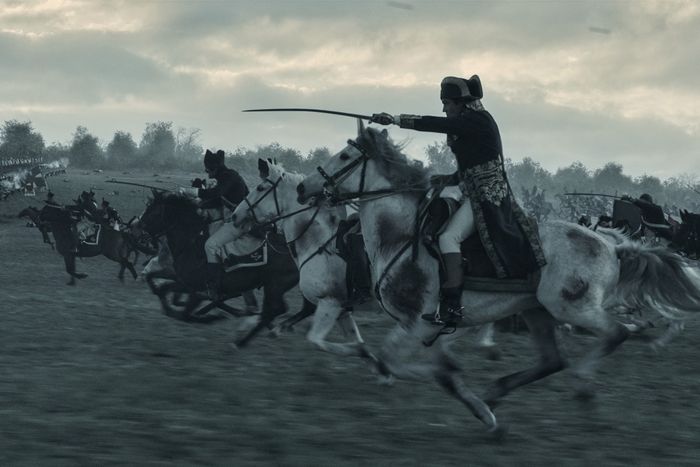
On January 23, 2024, Napoleon was nominated for three Oscars.
All of Napoleon’s best moments are about how the brilliant military commander at its focus is also a buffoon. The Napoleon Bonaparte of the film, played by Joaquin Phoenix, dozes off with his eyes open while Directory head Paul Barras (Tahar Rahim) tries to talk to him about a matter of political urgency. When Napoleon’s gestures at peacemaking are brushed off by a British ambassador, he yelps back, “You think you’re so great because you have boats!” Presented with a mummy while on a campaign in Egypt, he climbs onto a crate to get as close as possible to its desiccated face, as though expecting it to whisper advice in his ear. And during a fight with his wife, Joséphine (a wonderfully bemused Vanessa Kirby, who facilitates what have to be the year’s most indifferent sex scenes), over her failure to conceive, he describes the changes in his own body by declaring his appetites to be a matter of providence: “Destiny has brought me this lamb chop!” Phoenix is, at 5’ 8”, slightly taller than the man famously portrayed as diminutive, and is, at 49, disorientingly mature to be playing someone who’s around 24 when the film begins, but he is unfalteringly weird in a way that is its own reward.
It’s likely that Ridley Scott has never even heard of memes, but his new film is perfectly primed to live on through them. It’d be better off consumed that way than in its turgid entirety. Napoleon, which was written by David Scarpa, alternates between epic battles and scenes from its protagonist’s oddball marriage, and despite this, manages to become a drag. Although Scott obviously knows his way around a historical epic, this attempt is less Gladiator (his sword-and-sandal epic that launched Phoenix into fame) and more 1492: Conquest of Paradise, (his bloated Christopher Columbus biopic). We watch Napoleon’s rise to power, his wedding to and eventual separation from Joséphine, and his fall, all recreated without any animating idea beyond the juxtaposition of clownishness and battlefield prowess. Napoleon is not, thank god, a hagiography. But it has the faltering rhythms of a rough draft — it plays as though Scott gave up on trying to carve a good film out of what actually ended up on screen.
Napoleon begins with Phoenix’s Napoleon witnessing a frizzle-haired Marie-Antoinette, played by Catherine Walker, getting her head lopped off in front of a jeering crowd. To parse the film’s politics would be a fool’s errand. The few times it gets to street level, the public inevitably coalesces in the form of a bloodthirsty mob. Napoleon sees his place as among a most elevated crowd, while being aware that he’s seen as an uncouth arriviste from Corsica who, as he puts it in a letter to his brother Lucien (Matthew Needham), has to prove he’s fit for higher office. But any attempt to cast him as a populist strong man, an upstart soldier who crowns himself emperor, is undermined by the choice to seal off any wider perspective on the country. We’re shown Napoleon’s rise to power without ever seeing him, you know, rule. Napoleon gives you the impression that its main character spends his life compulsively fighting battles with the occasional pit stop home to tangle with his wife. When, after the catastrophe that was his invasion of Russia in 1812, Napoleon is exiled to Elba, it is staged as though he were a wayward twentysomething coming home to parents who’d finally tired of his constant partying and packed up his shit as a sign that it’s time to move out.
The battles are fine, by the way, though they become numbing as the film progresses—all those hoards of men on foot and on horseback hurling themselves at each other and at artillery that tears them up in gruesome fashion. The Battle of Austerlitz is easily the most exciting, perhaps with the aid of some embellishment: We watch from Napoleon’s perspective on high ground as he lures the allied Russian and Austrian forces into a trap, sending them onto a frozen lake that breaks beneath them and sends soldiers and horses plunging to their deaths. The sequence, shot from above and below, has a brutal beauty, blood unfurling in plumes around the bodies as they sink into the icy water. And sure, it’s funny that the movie’s version of Napoleon fires cannons at the pyramids, but it doesn’t amount to more than a lark. This Napoleon is a horny hobbit of a man who is only really at home on the battlefield, whose cuckolding gets mocked on the front page of the tabloids, and who has to put the woman he loves in cold storage in order to produce an heir. Scott, never one to be bothered about historical accuracy, has attracted criticism for playing fast and loose with the accepted details in the film, but the fudging matters less than what it’s in service to—which is nothing in particular.
More Movie Reviews
- The Accountant 2 Can Not Be Taken Seriously
- Another Simple Favor Is So Fun, Until It Gets So Dumb
- Errol Morris Has Been Sucked Into the Gaping Maw of True Crime


